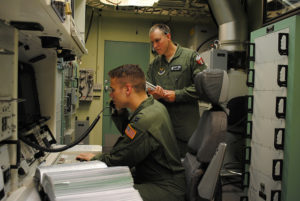In response to the recent string of bad news for the ICBM force, the Air Force has announced that it will make a number of changes to try to alleviate some of the morale problems that have been plaguing the force. The commander in charge of ICBM forces will be upgraded from a three star general to a four star, in keeping with equivalent commanders of other branches in the service; missileers will be eligible for new bonuses and incentive pay; a service medal for launch officers will be instituted; new ROTC scholarships for missile duty have been added, with ten already awarded; and more mid-level command personnel will be added, along with improved training for missile launch officers.
These changes are in response to complaints that the missile force, despite the importance of its mission, has long been neglected by the Air Force and has come to be seen as a career dead end, especially by younger service members.

A missileer practices launch procedures under the supervision of a trainer. Photo: AF GlobalStrike
The morale problem stems not just from perceived neglect, but also from the tediousness of the duty, which requires launch officers to continually practice to carry out a mission that everyone hopes will never be needed, and spend 24 hours or more in an underground command center when they are on alert, waiting for an order that is unlikely ever to come. It has been compounded by a culture that requires officers to achieve perfection on frequent written exams to have any hope of moving ahead in their careers. The Air Force has tried to address that problem as well by making the exams pass/fail (previously, although the official “pass” level was set at 90%, 100% was viewed as the actual requirement for those who hoped to move up) and increasing the emphasis placed on performance in simulations and field exercises when evaluating an officer’s performance.
An unpublished RAND study obtained by the Associated Press cited high rates of “burnout”—defined as feeling exhausted, cynical, and ineffective on the job—among launch officers. Andrew Neal, a 28-year-old launch officer who recently completed a four-year tour at a Minuteman III base, said that part of the morale problem is also due to a new view of the ICBM mission among the younger generation in the Air Force. “We all acknowledge their importance, but at the same time we really don’t think the mission is that critical,” he said, and among his peers the threat of full-scale nuclear war is seen as “simply non-existent…So we practice for all-out nuclear war, but we know that isn’t going to happen.”
Another former launch officer, Brian Weeden, who was on alert during 9/11, said that the experience left him and his colleagues feeling helpless. “The mantra had always been that the nuclear deterrent would keep America safe. But it didn’t. So I felt, not only did we fail to deter those attacks, but we couldn’t do anything about it after.”
It is worth pointing out that there were plenty of problems with the ICBM forces even during the cold war, when presumably launch officers riding the elevator down to begin their shifts believed that they were a crucial part of the country’s defense and could be called on at any moment to carry out an order to launch one of the most powerful weapons in the world. Still, sitting in an underground capsule for 24 hours at a time, the vast majority of them with nothing much happening, is no one’s idea of excitement. As Eric Schlosser notes in his book Command and Control, drug and alcohol use was a longstanding problem in the nuclear forces, as well as the rest of the military. Several former launch officers have claimed that cheating on exams is also nothing new.
Nonetheless, the comments of those serving in the post-cold war, and especially post-9/11, era provide an interesting insight into the dilemma currently facing the ICBM force more generally. The danger of a full-scale nuclear war, in which the United States would deliberately launch hundreds of warheads at enemy targets, is so far out of the realm of reality that even those who constantly practice for it, and whose careers depend on preparing for it, can’t conceive of a situation in which it might actually happen. The average American, who has no such immediate day-to-day connection to nuclear weapons, is even less capable of this.
Unfortunately, U.S. political and military leaders have better imaginations. So, these missiles remain on high alert—ready to launch in minutes, with missileers still sitting in their underground capsules around the clock, waiting for something to happen. This high alert posture creates the risk of launching by accident, without authorization, or in response to a false warning of an incoming attack. We should be worried about much more than poor morale.
